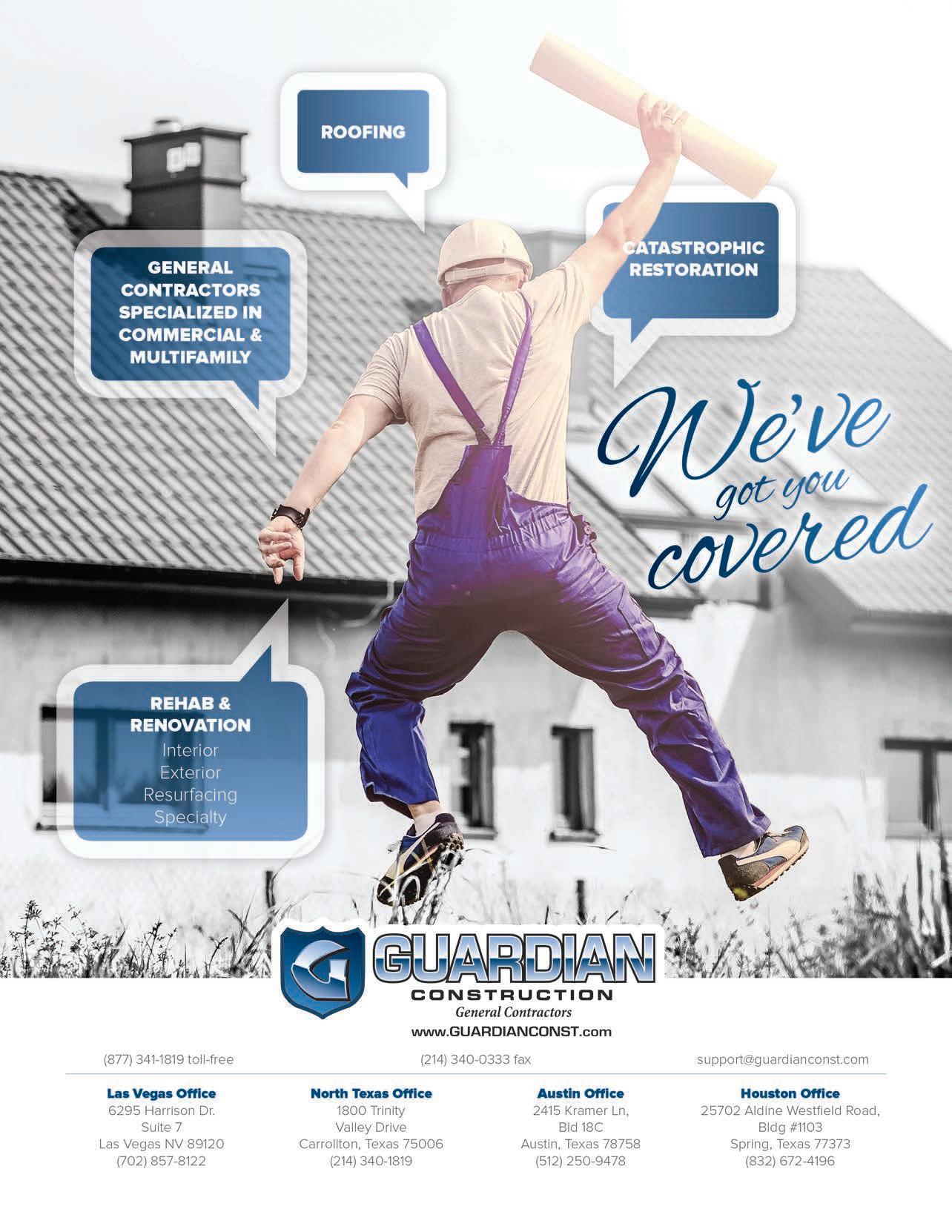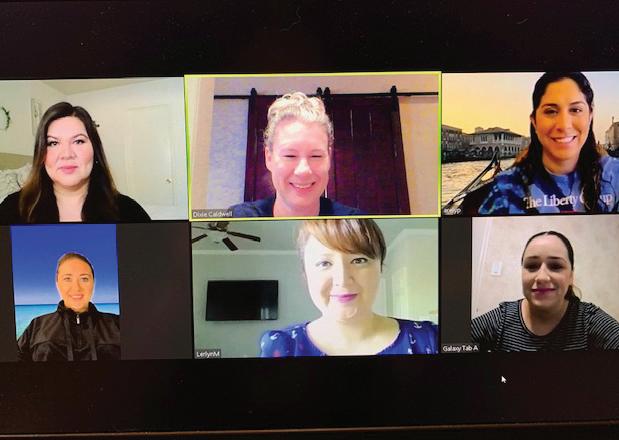
9 minute read
Your Role in Teamwork
from ABODE May 2020
The third article in a follow-up series on Debbie Phillips’ four cornerstones for effective teamwork. By DEBBIE PHILLIPS, Ph.D, CPM, The Quadrillion
Your Role in Teamwork –Communication Beyond Words
A note from the editor: This article was written in early March before Houston had any confirmed COVID-19 cases. It almost feels insensitive to publish articles that aren’t focused on the virus, but an article on communication during a time like this could be beneficial to everyone, and communication is more important than ever right now. As a leader, it’s important to communicate during times of heightened sensitivity and anxiety with transparency, certainty, empathy, humanity, inspiration and in a way that unites people. With the situation changing so fast and it being unknown territory, people value leader communication more than ever right now. Take this article as ways to communicate with your coworkers and to your employees for your consideration M y January article, titled Your Role in Teamwork, emphasized four core elements in relationships within teams: trust, commitment, communication and connection. Merely one quarter into 2020 and I think we can all agree that it has been quite a year so far. I am more convinced than ever that literary critic and Nobel Prize recipient George Bernard Shaw was right when he said, “The greatest problem with communication is the illusion that it has been accomplished.”
At press time, Malcolm Gladwell’s “Talking to Strangers” has sat on the New York Times bestseller list for 27 weeks. Gladwell’s latest work includes famous examples of how miscommunication serves as the backdrop of potential conflicts and misunderstandings. With the everchanging and growing COVID-19 pandemic, effective communication will be a topic of interest throughout 2020.
What You Say and Your Body Language
Communication can be defined as the process of sharing information, thoughts and feelings between people orally, in writing and through body language.
So, communication is not just about your words – people also take in visual cues or listen with their eyes. Communication experts agree
that communication is 7% of your actual words, tone of voice is 38% and body language makes up 55%. Subtle nonverbal messages enhance intent and meaning through the presence, stance and eye contact of the sender. When the communicator’s message says one thing and their body language says another, it leaves the receiver not only confused about the message, it can also create an environment of mistrust.
Effective communication requires that the content and body language be congruent. Our posture and our stance can either strengthen or weaken our message, according to Amy Cuddy, body language expert.
Advancing Careers and Personal Development
Effective communication can often be a game-changer for people seeking advancement. It can also increase a person’s potential for personal development. Influencing others, competing for a job or winning the trust of your team or customers depends largely on your ability to communicate effectively.
A 20-year study that followed progress of Stanford University’s Master of Business Administration students revealed that the most successful graduates (as measured by both career advancement and salary) developed their communication skills by choosing courses such as business writing, leading, persuading, selling ideas, negotiating, conducting meetings, resolving conflicts and working with cultural diversity.
After college, technical skills that can help secure a first job or first promotion don’t necessarily guarantee your next move. Successfully coaching teams, managing stress, delivering information and collaborating with others are highly dependent on a person’s ability to communicate. Renowned psychologist Daniel Goleman would add that emotional intelligence exhibited in the examples listed above accounts for nearly 90% of what sets high performers apart from their peers with similar technical skills and knowledge. Emotional intelligence is defined as the ability to understand and manage your own emotions as well as recognize and influence the emotions of those around you. Experts caution leaders when making decisions based off emotions. When leaders do make a decision based off an emotion, it causes them to rush to bad judgments because they’re unconsciously filtering the information they’ve received.
Your communication skills show up in your own personal dashboard, indicating the quality of the relationship you have with yourself and with others. As author Susan Scott said in her book, “Fierce Conversations,” the quality of each of your relationships is based on one conversation at a time.
Leadership and Communication Today
Today, communication is like a superhighway. We live in a 24-hour information age where everything we want to know is just a Google search or a “Hey, Alexa” away. At work, people want two-way, real-time conversations within their teams and leaders. This doesn’t mean we need to throw out traditional methods of communication, but it does require a bit of adjustment.
Leaders of the past would give a speech at a podium and walk off the stage. Today, leaders may still give speeches while standing at a podium, but they don’t walk away right after. They stay, take live questions and have realtime chats. If you have ever watched Steve Jobs on stage, his expertise preciseness of storytelling combined with his passion made him one of the most influential business communicators of our time. He, like all powerful leaders, knew that knowing your audience and connecting with them were key to getting your message across.
Are We Taught Communication?
According to Forbes.com, less than 2% of all professionals have had formal education or learning to understand and improve listening skills and techniques (Llopis, 2013). Yet, the Society of Human Resources Management reveals that at least 80% of companies in finance, insurance, real estate and services assess writing skills during their hiring process. An interesting statistic considering the National Commission on Writing found that U.S. businesses spend $3.1 billion annually training people to write.
When my students question the high volume of writing assignments in my classes, I’m quick to remind them of these statistics. Over the years, I’ve changed the length of my assignments from an in-depth research paper to an executive summary as a way of training the students to be succinct and effective in their writing. Harvard Business Review recently investigated the impact of information overload as it relates to written material in their feature article titled The Elements of Good Judgement.
Listening
Active listening is key to strengthening relationships and ensuring understanding and cooperation in teams.
There should be more emphasis devoted to the importance of listening in course curricula, which is also echoed by the Greek philosopher Epictetus. He said, “We have two ears and one mouth so that we can listen twice as much as we speak.”
Research suggests that the average person hears between 20,000 to 30,000 words within 24 hours. There is a need to understand not only what we’re communicating, but how it’s being received.
“Let the silence do the heavy lifting” advises author Scott when it comes to coaching and developing your team members.
Silence is one of the most powerful weapons an individual can bring to the table when negotiating. Long, drawn-out pauses are awkward and uncomfortable, and it’s just human nature to want to fill the void, often without thinking. In most cases, the first one to speak often ends up losing. After working with a professional coach and taking multiple Dale Carnegie courses, I’ve learned there is power in silence.
I now think of my words in terms of currency – they have value. I practice the art of pausing before speaking. Thinking about what I want to say and to whom I’m saying it forces me to choose my words more carefully. As a professional speaker, educator and writer, I’m a lifelong learner. Confucius said, “I hear and I forget, I see and I remember, I do and I understand.”
When it comes to enhancing the effectiveness of our communication, it comes down to two simple things: 1. Precision of your plan and 2. Preciseness of your speech. Plan what you want to say before you say it and choose your words carefully. You are more effective when you are selective, and this applies to everything. So, choose your words wisely, and more importantly, listen carefully as they offer valuable clues.
Debbie Phillips is an internationally recognized industry thought leader, educator, career coach, author and speaker who holds a doctorate degree. She has dedicated her life’s work to educating and connecting high potential talent to opportunities in the real estate industry. Phillips can be reached at debbie@thequadrillion.com or 404-787-4409.
FOCUS, continued from Page 55 2020 habits in a world that daily transforms our normal. Momentum keeps us from reverting back to old habits and maintaining the proper course.
Why do people fail? One single moment in time is rarely responsible for our failures. It’s thousands of little misguided choices that lead to hardship. We lose our focus in small decisions that compromise our standards and replace our success with excuses. Momentum keeps us focused on our goals.
When I did my swim workouts, I repeated a statement of affirmation in my mind as I swam, “The water holds me high and strong; I can do this all day long.” Then, with each stroke I would say to myself, “I am a twotime triathlete.” I did 33 laps in a 25-meter pool, two times a week for months. Unfortunately, nine days before the race, I was rushed to the emergency room in severe pain and diagnosed with Acute Diverticulitis. I was put on potent antibiotics to fight the infection, bed rest and a liquid diet. My 10- day plan before the race was ambushed, and I was left wondering if I could even participate. I had dinner with some very influential friends who gave me permission to quit. They told me no one would expect me to race after this diagnosis so close to the race.
I was physically weak from fighting the infection, and very unprepared, but I decided to continue with my race. I could not quit without at least attempting to reach my goal. For momentum, I organized all of my workout gear for the swim, bike and 5K on my dining room table. Every day, the vision of my gear inspired me to race. My focus fueled my commitment.
Provide your team with printable visual affirmations and reminders of their goals. Practice remote team-building, connect remote teams with mentors and support to keep their momentum strong. Share industry hashtags: #multifamilystrong and create your own #ALLIN hashtags teams can share to maintain positive energy. I look forward to national news stories reporting how essential apartment management teams provided a sense of community to help Americans. There has never been a better time than now for the principles of focus: vision, commitment and momentum. This is our time to shine. As a 60-year-old, non-athletic woman weakened by infection, I crossed my finish line, and it will be these valuable principles that help you cross your finish line, too.
Toni Blake is a touring speaker with the Apartment All Stars and owner of TotallyToni.com. She is celebrating over four decades in property management and is one of three living recipients of the Multifamily PRO Industry Legend Award. Blake is a popular guest on industry radio and podcasts. She has hosted many of the top industry awards shows and has been featured as a speaker at the top industry local, state and national conferences.









